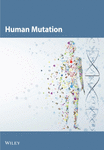Novel COL4A5, COL4A4, and COL4A3 mutations in Alport syndrome†‡
Communicated by Mark H. Paalman
Online Citation: Human Mutation, Mutation in Brief #820 (2005) Online http://www3.interscience.wiley.com/homepages/38515/pdf/820.pdf
Abstract
This study summarizes 47 novel mutations identified during routine molecular diagnostics for Alport syndrome. We detected 34 in COL4A5, the gene responsible for X-linked Alport syndrome, and 13 in COL4A3 and COL4A4, the genes responsible for autosomal recessive Alport syndrome. A high detection rate of 90% was achieved among patients with typical clinical symptoms and a characteristic family history in both X-linked and autosomal recessive forms, and it can be assumed that most relevant mutations have been identified. In numerous positively tested patients, genetic variations which are unknown were detected. © 2005 Wiley-Liss, Inc.




